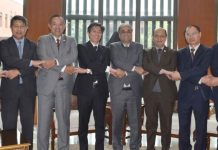By Zhong Sheng, People’s Daily
The Group of Seven (G7) Hiroshima Summit ended amid protests on May 21. Despite its vows to build a “peaceful, stable and prosperous world” and uphold “international order based on the rule of law,” the summit did nothing to tackle global challenges. On the contrary, it arbitrarily interfered in other countries domestic affairs and provoked divide and confrontation.
A joint statement was released after the meeting, which hyped a series of China-related topics, slandered and attacked China, grossly violated China’s domestic affairs and blatantly challenged the post-war international order.
This seriously violated the basic norms governing international relations and fully proved that the G7 has become a tool that protects the hegemony of the United States. The Western clique is growing into a source of risks against world peace and stability, and a saboteur of the international order.
The erroneous remarks made by the G7 on the Taiwan question provided evidence of the group challenging post-war international order.
Taiwan is China’s Taiwan. Resolving the Taiwan question is a matter for the Chinese, a matter that must be resolved by the Chinese. The one-China principle is what underpins peace and stability across the Taiwan Strait.
The G7 always stresses the importance of respecting other countries’ sovereignty and territorial integrity when speaking of the Ukraine crisis. However, it says nothing about the need to oppose “Taiwan independence” though it keeps emphasizing cross-Strait peace. Such double standards in effect constitute connivance and support for “Taiwan independence” forces, and will never lead the group to good results.
Over the recent years, the United States has followed the salami tactics on the Taiwan question, distorting, manipulating, fudging and hollowing out the one-China principle. Some high-ranking U.S. officials even claimed that the Taiwan question is not China’s domestic affair.
The G7 Hiroshima Summit propagated that the Taiwan question exerts important impacts on the security and prosperity of the world, which fully proves that the G7 is reduced to an accomplice of the United States to “contain China with Taiwan,” and standing on the opposite side of the post-war international order.
The G7 talks like a parrot when it comes to issues related to the East China Sea, the South China Sea, Hong Kong, Xinjiang and Tibet, spreading lies fabricated by the United States and trying to smear China with the so-called “economic coercion.” Its ultimate goal is to tarnish China’s image and peddle the “China threat” theory.
Despite the chaotic governance and poor human rights records of its own members, the G7 is always interfering in China’s domestic affairs, such as issues related to Hong Kong, Xinjiang and Tibet, in the name of “democracy” and “human rights.” This only reveals the group’s hypocrisy and hegemony.
The East China Sea and the South China Sea have remained overall stable. The G7, using maritime issues to drive a wedge between regional countries, is indeed posing risks for the stability in the region. The United States, which resorts to illegal unilateral sanctions, long-arm jurisdiction, decoupling, breakage of supply and industrial chains, and politicizing and weaponizing economic and trade ties, is indeed the origin and expert of “economic coercion.” The G7 is completely doing the United States’ bidding as an accomplice of “economic coercion.”
U.S. hegemony is seen in every word in the joint statement released after the G7 Hiroshima Summit. The summit, which was a political farce, indicated that the United States is trying to turn its tactic of denigrating and containing China into a consensus of the G7.
Protectors of justice around the world are highly alert to hegemonic countries doubling down efforts to provoke bloc confrontation, sabotage the international order and undermine peace and stability with their cliques. The international community will not accept the “Western rules” dominated by the G7 and drawing ideological and value lines, nor will it tolerate the West’s lecturing.
Some said the G7 has become a “political group” that is manipulated by the United States and cannot represent the whole world, and the decisions made by the group are totally politics-oriented and aimed at seeking political and economic interests for the United States at the expense of other countries’ interests. Some said such a political group that hinders the development of other countries should be eliminated by history. These voices of justice exactly mirror the true attitude of most countries in the world toward the G7, a group that goes against the trend of history.
UN Secretary-General Antonio Guterres joined a press conference in Hiroshima on the day the G7 concluded, which attracted high attention. He listed the moral, power-related and practical injustices faced by developing countries.
“In our multipolar world, as geopolitical divisions grow, no country or group of countries can stand by as billions of people struggle with the basics of food, water, education, healthcare, and jobs,” he said, adding that “Here in Hiroshima, it’s time to demonstrate global leadership and global solidarity.”
His remarks represented the requests raised by the developing world for the G7, the “rich country club.” However, the G7 turned a deaf ear to the remarks though it was trying to rope in developing countries. On the contrary, it kept undermining international order and trampling on equity and justice, which disappointed developing countries.
American political scientist Parag Khanna believes that the G7 is no longer qualified for coordinating global issues and its summit was meaningless.
Gone are the days when a handful of Western countries can just willfully meddle in other countries’ internal affairs and manipulate global affairs. When the international community, especially the developing world, is gaining an increasing awareness for strategic independence, the G7 will only be further isolated if it continues assisting the United States to pursue hegemony.
The G7 needs to reflect on its behavior, rather than continuing its wanton act. Only by stopping forming closed and exclusive small circles, stopping containing and oppressing other countries, stopping provoking bloc confrontation and returning to the right track of dialogue and cooperation, can the group avoid becoming a stumbling block for world peace, stability and development and avoid being eliminated by the trend of the times.
(Zhong Sheng is a pen name often used by People’s Daily to express its views on foreign policy and international affairs.)












